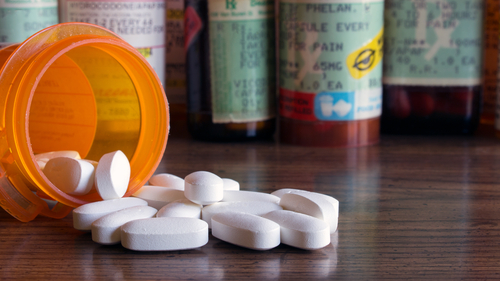Opioids are medications prescribed for pain relief, which can be either natural or synthesized in a laboratory. Physicians generally prescribe opioid treatment to patients experiencing severe pain. Some of the instances when a doctor would prescribe this sort of treatment is when a patient: – suffers from a chronic illness such as cancer – has experienced a serious injury – is recovering from a surgery – is experiencing severe toothaches Opioids include strong prescription painkillers such as tramadol, oxycodone, and fentanyl. However, it is crucial to remember that heroin belongs among opioids as well.
How do opioids work?
In order to better understand why doctors prescribe opioids in the first place, we need to take a look at how they work. In our brains, there are opioid receptors, which are also located in the gut, spinal cord, and other body parts. When opioids enter our system, they attach to these nerve cells and block the painful sensations people would otherwise experience. When a person takes opioids, dopamine is released into the brain?s reward center. This is the same part of the brain triggered when eating, drinking, or having sex. However, just like any other drug, opioids come with quite a few side effects. Some of the most common ones include: – nausea – sleepiness – constipation
Opioid dependence vs. addiction
When taking opioids, it is important to know the difference between dependence and addiction. If you were prescribed opioids, you are dependent on them. In other words, your body needs them to treat the pain you are experiencing. Therefore, opioid dependence is not a bad thing per se. However, opioids are drugs and thus they should always be taken with caution. Even though opioids can be a great way to treat chronic pain, they also come with great risk. If patients take opioids excessively or over a long period of time, there is a high risk of opioid addiction. Opioid addiction, just like addiction caused by most other drugs, will cause you to crave the feeling of relief the drug provides. And this is precisely why you should only take opioids as instructed by your doctor. Opioids provide your brain with artificial endorphins which not only block your pain but also get you high. If you use too many opioids, your brain will stop producing natural endorphins and start craving the drug. As a matter of fact, it is estimated that more than 2 million Americans misuse opioids. And the longer you take opioids, the more likely you are to develop an addiction. Addiction occurs when your body learns to tolerate the prescribed dose. What ensues is that people start convincing themselves that they need a higher dose. And this is when all kinds of problems arise.
Symptoms of opioid addiction
Opioid addiction can cause psychological, physical, and behavioral symptoms. The clearest sign of opioid addiction is the inability to stop taking the substance. However, there are a number of additional symptoms you should look out for: – nausea and vomiting – slurred speech – irritability – poor coordination – feeling of euphoria – depression or other mental health problems – irregular sleep pattern – drowsiness or coma – loss of libido and sexual dysfunction In case of opioid overdose, the patient will display some, if not all of the following symptoms: – no or irregular breathing – weak or absent pulse – nausea and vomiting – loss of consciousness If these symptoms occur, the patient should be immediately rushed to the emergency room.
Opioid withdrawal
When a patient is done with their opioid treatment, withdrawal symptoms can occur even a few hours after the last dose. And even though it is more probable that the withdrawal will appear if the patient was suffering from an addiction, it could happen to anyone. Withdrawal usually lasts from 3 to 5 days, but it could even last up to 10 days. Some symptoms of opioid withdrawal include: – opiate cravings – muscle cramping – nausea – anxiety and depression When a person is at the peak of opioid withdrawal, the symptoms may become more serious. They usually manifest as intense anxiety, rapid heart rate, or panic attacks. Opioid withdrawal is not necessarily life-threatening. Nevertheless, it can still lead to relapse and recurring addiction. Luckily, relapse can be prevented with the help of medication or therapy.
Treating opioid addiction
As soon as you realize that you are suffering from opioid addiction, it is crucial that you seek medical help for your addiction. The best option would be to talk to a qualified clinician, as they will determine how serious the addiction is and also find the best treatment. However, the treatment for opioid addiction differs from person to person. It is important to know the most common medications that doctors prescribe for opioid addiction and withdrawal: – Methadone and buprenorphine These are the most commonly prescribed medications for treating opioid withdrawal. They affect the same nerve cells as opioids but they don?t cause the same high. Instead, they help your brain heal by restoring its balance. These medications can be used long-term, as they don?t cause addiction. – Naltrexone This medication is prescribed to people suffering a relapse. In other words, they are used together with other medications to prevent opioid users from relapsing. Medication is a great way to treat a physical addiction to opioids. Some people, on the other hand, may also need psychological therapy because they can also develop an emotional or psychological addiction to opioids. Cognitive therapy and counseling are recommended to people who can?t overcome their addiction with medication alone. As mentioned above, withdrawal is much more difficult if someone has already developed an opioid addiction. In that case, the withdrawal can last for months or even years. In addition, recovering addicts can be overly sensitive to pain and stressful events. The chance of relapse is also higher for recovering addicts. They feel a desire to escape the seemingly never-ending torture caused by withdrawal. If these people don?t receive medical care, relapse and overdose are highly likely to happen.
Opioids and pregnancy
Since opioids are strong and highly addictive drugs, they are especially dangerous for pregnant women. Opioid use during pregnancy can be dangerous for both the mother and the unborn baby. The dangers of opioid abuse during pregnancy include: – birth defects, such as spina bifida and heart defects – miscarriage – low birthweight – preterm labor and premature birth If a woman is planning on having a baby, it goes without saying that she should avoid opioids altogether. Also, in case a woman experiences an unexpected pregnancy while taking opioids, she should consult a doctor. Even though it is possible to undergo an opioid detoxification treatment, the fetus will still be at risk. When going through opioid detox while pregnant, medical help is essential. It is not advisable to just go ?cold turkey?, as that could lead to serious problems, including stillbirth, premature birth, and growth problems in the baby. Therefore, it is recommended to consult your doctor about the best way to fight addiction while maintaining the baby?s health. It can be easy for a woman to give in to her opioid addiction while pregnant. In fact, a number of women around the world are addicted to Vicodin or Percocet, better known as ?household opioids?. In that case, there is a high chance that the fetus will go through neonatal withdrawal. However, it should be noted that there are certain cases when women are prescribed opioids while pregnant. This occurs when the woman is in chronic pain during her pregnancy. Luckily, the opioid doses prescribed in these cases are usually minor and pose no risk to either her or the baby?s health.
Conclusion
If you choose to take opioids, be sure to take care and do so with the guidance of a doctor or medical professional.







